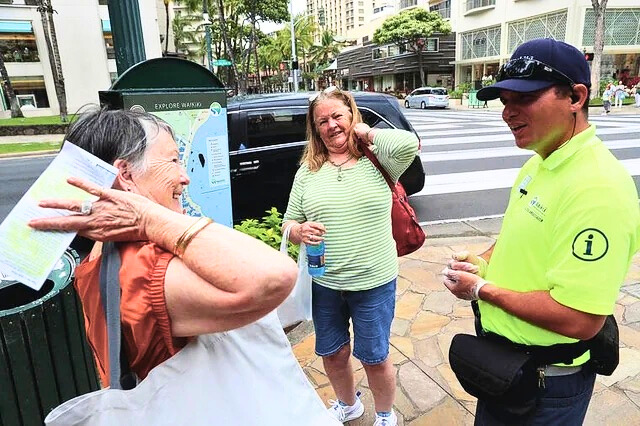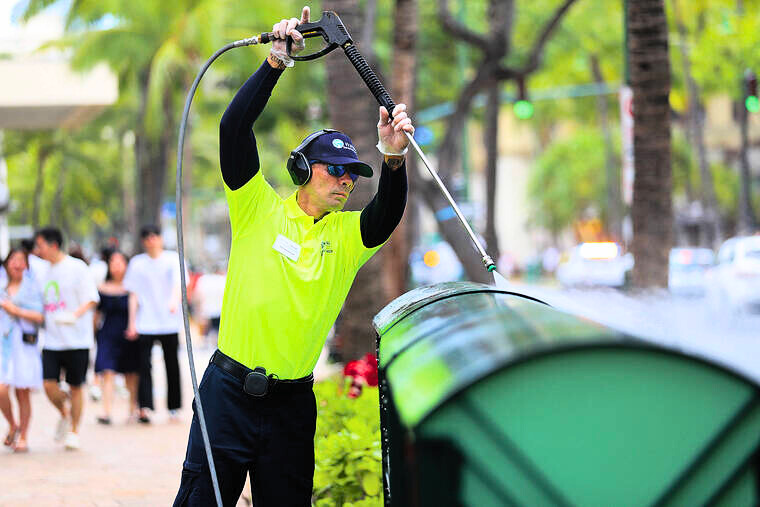Second Chances: Former inmates help bring new life to Waikiki as Aloha Ambassadors
By: Allison Schaefers | aschaefers@staradvertiser.com
This article has been shared from Honolulu Star Advertiser

Waikiki BID Ambassadors provide hospitality to district visitors.
Jason Esau uses a pressure washer to remove dirt and grime from the sidewalks of Waikiki, while his Team Leader, Kyle Hostallero, stops to give directions to two international visitors.
The men are part of the Waikiki Business Improvement District Aloha Ambassador program, which will expand to24 hours, seven days a week this summer and is projected by year’s end to remove 500,000 pounds of trash and serve over 350,000 visitors. It’s hard work, but Esau and Hostallero smile often as they labor to leave Waikiki better than they found it. Their work brings new life to Waikiki and provides them with a second chance, too.
The men are part of the Aloha Ambassadors second chance program, which is a partnership between the Waikiki Business Improvement District and the Laumaka Work Furlough Center/Oahu Community Correctional Center. The program employs low-risk, incarcerated people, and recently released people.
Aloha Ambassadors serve as the hospitality hosts of Waikiki, providing information and assistance to those whom they encounter on the sidewalks of the Kalakaua Avenue-Kuhio Avenue corridor. Those on the clean team provide cleaning and maintenance services to supplement the city’s efforts. There also are safety ambassadors who provide services to make residents and visitors more secure.
Trevor Abarzua, WBID president and executive director, said the organization has more than 60 Aloha Ambassadors, and 16 of them are in the second-chance program, which ahs helped augment the expanding program’s needs. That’s up from 10 second-chance employees in 2023.
The Aloha Ambassador program’s current hours are 6:30 a.m. to 11 p.m., but Abarzua said that on July 1 is it slated to begin providing 24/7 safety Ambassadors at Kuhio Beach Park, with a homeless and mental health outreach component overnight. The change is contingent on the mayor’s budget passing, he said.
“The idea behind it is having an extra layer of safety presence here in Waikiki. They will be more of an outreach component to the overnight services,” he said.
Robert Lee, WBID director of operations, said the Aloha Ambassadors, especially those in the second-chance program, are proactive. They are an example to their peers of what they can do to turn around their lives before they reach that tipping point,” Lee said.

A Waikiki Ambassador pressure washes some newspaper receptacles.
Uplifting outreach
Abarzua said WBID has hired 34 second-chance people since June 2018, and they have a combined employment of 16,675 days with an average of 1.34 years of employment.
“Once they graduate from the work release program with us, some move on to other companies and jobs with the experience they gained as an Ambassador,” he said.
However, Abarzua said some have stayed at WBID, where the longest-tenured second-chance employees have been in the program almost six years. He said some second-chance employees have been promoted to manager positions and speciality higher-paid positions like team mechanic, which has helped the program develop a culture of membership.
Hostallero manages 25 to 30 workers as a clean-team leader but also serves as an example to those from his past whom he sees on Waikiki’s sidewalks and streets.
“I don’t’ always give them money, because I know it will probably go to alcohol or drugs, but I do make the time to hear them out and give them some words of encouragement. I’ll say, ‘Hey, If I can do it, you can do it,” Hostallero said. “If someone had come up to me before, I would have definitely thought about it and tried to work to do better.”
Hostallero said he enjoys giving back through the second-chance program, which has afforded him another chance at life. Originally from Kauai, he said, “I’ve struggled with drug addiction and alcoholism and some mental health issues due to drugs, which caused me to break some laws—nothing serious, but enough to land me in prison.”
While serving time, he said, he enrolled in the Kashbox intensive treatment program which helped support his sobriety and encouraged him to mend fences with family, including his now 12-year-old son. The program also helped Hostallero set goals, but until he found the second-chance program, it was hard to meet them.
“Before being released, I had plans at looking at construction or working as a painter. I had great ambition. But once I got out, I was applying at all these places and was getting told no or wasn’t getting called back. There were a lot of roadblocks,” he said. “Once I applied at Block by Block (a WBID contractor), they gave me a chance.”
To read the rest of this article, click here.